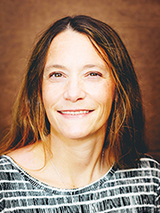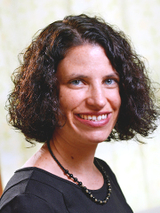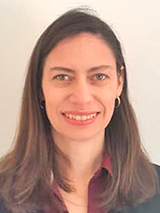To celebrate International Women’s Day, Children’s Hospital of Philadelphia is highlighting a few female leaders who’ve been on the front lines battling COVID-19 in the United States, Dominican Republic and Botswana.
These women — and so many other individuals from CHOP’s Global Health Center — are helping families around the world as they battle the novel coronavirus. While children have largely been spared from COVID-19 complications compared to adults, in the United States alone, approximately 2 million children have had COVID-19. In the past 15 months, more than 117.5 million people have been infected with COVID-19, and more than 2.6 million have died worldwide.
Three female healthcare leaders — Keri Cohn, MD, MPH, DTM&H; Mina Halpern Lozada, MPH; and Tonya Arscott-Mills, MD, MPH, — shared their experiences dealing with COVID-19, and how the pandemic impacted the way they could offer and provide care to children around the world.

“In the early days of the pandemic, I saw conditions that reminded me of the time I spent in Sierra Leone fighting Ebola. During the Ebola crisis, I learned that human resources are our best asset. Even when colleagues fell ill or we witnessed terrible deaths, we always returned each day and gave patients our best because we felt appreciated and protected in our work.
While leading the CHOP Emergency Department’s COVID-19 response, I was in awe of my colleagues who were making those same sacrifices for our patients, communities, and each other. Their dedication reminded me of my faith in humanity and what we can achieve when we support one another. Protecting each other places us in the best position to end COVID-19.”
Keri Cohn, MD, MPH, DTM&H
Emergency Department, Children’s Hospital of Philadelphia
Faculty Member, CHOP Global Health Center
COVID-19 has revealed that to achieve health and wellbeing for ourselves we have to ensure the health of every person across the world. The CHOP Global Health Center has been working toward this goal by advancing children’s health to create a healthier future for the world’s most vulnerable children through collaborations with partners in 17 different countries including the Dominican Republic and Botswana.

“COVID-19 has undoubtedly been the most significant challenge I have faced during my 10 years as Executive Director of Clínica de Familia La Romana in the Dominican Republic. It has required many tangible adaptations in the way that services are provided. Our detailed contingency plan lays out all our policies and procedures to protect staff and vulnerable clients, ranging from social distancing, masking and hand-washing guidelines to increasing community-based services for clients, such as more home visits and delivery of food and medications. We have augmented our in-person contact with remote interventions, when feasible, and have also increased nutritional support to our clients with HIV who are food insecure.
COVID-19 has also compelled us to make other changes, such as those that are designed to protect the mental health of our staff. Increased communication with staff and supportive check-ins from colleagues, supervisors and the leadership team have ultimately increased the cohesion and dedication of our staff, who understand that the work they do daily is vital to the health and well-being of our clients.”
Mina Halpern Lozada, MPH
Executive Director, Clínica de Familia La Romana, Dominican Republic
“When COVID-19 lockdowns were instituted, some of our research projects in Botswana went virtual and we provided personal protective equipment (PPE) to other research teams, but all teams had to follow standard social distancing guidelines. In addition to following Botswana’s guidelines, we had to follow our own guidance early on and discern which of the Penn regulations were appropriate to our setting, given the differences in how the pandemic was unfolding in Botswana versus Philadelphia. There were ways that the South was better equipped to deal with COVID-19 than the North.

Although frustrating, the curveballs that the pandemic has thrown have encouraged us to think strategically about balancing public health needs with direct clinical care and research needs without compromising any breakthroughs in children’s health. With an eye toward the future, there is room for us to think creatively about leveraging innovations and changes brought about by the pandemic to improve care in other areas like using COVID-19 vaccine apps for routine disease surveillance.”
Tonya Arscott-Mills, MD, MPH
Research Director & Lead Pediatrician, Botswana-UPenn Partnership
Faculty Member, CHOP Global Health Center
Featured in this article
Specialties & Programs
To celebrate International Women’s Day, Children’s Hospital of Philadelphia is highlighting a few female leaders who’ve been on the front lines battling COVID-19 in the United States, Dominican Republic and Botswana.
These women — and so many other individuals from CHOP’s Global Health Center — are helping families around the world as they battle the novel coronavirus. While children have largely been spared from COVID-19 complications compared to adults, in the United States alone, approximately 2 million children have had COVID-19. In the past 15 months, more than 117.5 million people have been infected with COVID-19, and more than 2.6 million have died worldwide.
Three female healthcare leaders — Keri Cohn, MD, MPH, DTM&H; Mina Halpern Lozada, MPH; and Tonya Arscott-Mills, MD, MPH, — shared their experiences dealing with COVID-19, and how the pandemic impacted the way they could offer and provide care to children around the world.

“In the early days of the pandemic, I saw conditions that reminded me of the time I spent in Sierra Leone fighting Ebola. During the Ebola crisis, I learned that human resources are our best asset. Even when colleagues fell ill or we witnessed terrible deaths, we always returned each day and gave patients our best because we felt appreciated and protected in our work.
While leading the CHOP Emergency Department’s COVID-19 response, I was in awe of my colleagues who were making those same sacrifices for our patients, communities, and each other. Their dedication reminded me of my faith in humanity and what we can achieve when we support one another. Protecting each other places us in the best position to end COVID-19.”
Keri Cohn, MD, MPH, DTM&H
Emergency Department, Children’s Hospital of Philadelphia
Faculty Member, CHOP Global Health Center
COVID-19 has revealed that to achieve health and wellbeing for ourselves we have to ensure the health of every person across the world. The CHOP Global Health Center has been working toward this goal by advancing children’s health to create a healthier future for the world’s most vulnerable children through collaborations with partners in 17 different countries including the Dominican Republic and Botswana.

“COVID-19 has undoubtedly been the most significant challenge I have faced during my 10 years as Executive Director of Clínica de Familia La Romana in the Dominican Republic. It has required many tangible adaptations in the way that services are provided. Our detailed contingency plan lays out all our policies and procedures to protect staff and vulnerable clients, ranging from social distancing, masking and hand-washing guidelines to increasing community-based services for clients, such as more home visits and delivery of food and medications. We have augmented our in-person contact with remote interventions, when feasible, and have also increased nutritional support to our clients with HIV who are food insecure.
COVID-19 has also compelled us to make other changes, such as those that are designed to protect the mental health of our staff. Increased communication with staff and supportive check-ins from colleagues, supervisors and the leadership team have ultimately increased the cohesion and dedication of our staff, who understand that the work they do daily is vital to the health and well-being of our clients.”
Mina Halpern Lozada, MPH
Executive Director, Clínica de Familia La Romana, Dominican Republic
“When COVID-19 lockdowns were instituted, some of our research projects in Botswana went virtual and we provided personal protective equipment (PPE) to other research teams, but all teams had to follow standard social distancing guidelines. In addition to following Botswana’s guidelines, we had to follow our own guidance early on and discern which of the Penn regulations were appropriate to our setting, given the differences in how the pandemic was unfolding in Botswana versus Philadelphia. There were ways that the South was better equipped to deal with COVID-19 than the North.

Although frustrating, the curveballs that the pandemic has thrown have encouraged us to think strategically about balancing public health needs with direct clinical care and research needs without compromising any breakthroughs in children’s health. With an eye toward the future, there is room for us to think creatively about leveraging innovations and changes brought about by the pandemic to improve care in other areas like using COVID-19 vaccine apps for routine disease surveillance.”
Tonya Arscott-Mills, MD, MPH
Research Director & Lead Pediatrician, Botswana-UPenn Partnership
Faculty Member, CHOP Global Health Center
Contact us
Global Health Center